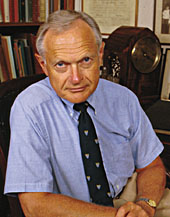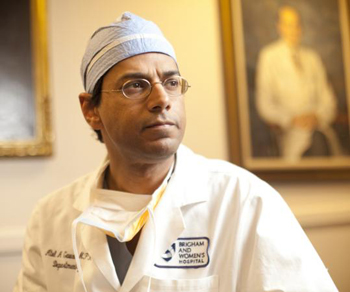For Sunday June 7, 2015
Lectionary Readings (Revised Common Lectionary, Year B)
1 Samuel 8:4–20, 11:14–15 or Genesis 3:8–15
Psalm 138 or 130
2 Corinthians 4:13–5:1
Mark 3:20–35
As I approach my 60th birthday, I've started reading stuff about growing old. If you're not careful, it's easy to lose heart.
Last week I read The Art of Aging; A Doctor's Prescription for Well-Being by Sherwin Nuland, a Clinical Professor of Surgery at the Yale School of Medicine. There's a very thin line, observes Nuland, between denial and despair, between pretending nothing has changed and doing nothing at all. And a big difference between living long and living well.
Beyond the standard advice about diet, exercise, genetics, intellectual stimulation, and social connections, Nuland explores the intangibles of our attitudes, dispositions, and religious faith. It's not just about eating granola, he says. Cultivating equanimity over entitlement, contentment over complaining, or determination over discouragement, are only three examples of the attitudes we can choose about aging.
Aging brings both gains and losses. Cultivating the wisdom to separate fact and fantasy is huge, as is learning to live with uncertainty and adversity. One of the biggest lessons of aging, says Nuland, is that "choice exists for each of us." Aging is not a disease, it's a natural condition of every life. And if it's handled wisely, there really is more sugar at the bottom of the cup.
Nuland writes about living well as you get old. Atul Gawande has written a best seller about about dying well: Being Mortal; Medicine and What Matters in the End. Gawande argues that instead of acknowledging "the natural order of things," we've been seduced by "the prevailing fantasy that we are ageless."
Instead of acknowledging the limits of medical treatments, we've turned mortality into an almost purely "medical experience," which in turn has led to denial, dishonesty, arrogance, and, for the elderly and the dying, horrible social isolation. This reduction of mortality to medicine, says Gawande, harms instead of heals.
 |
|
Sherwin Nuland.
|
Acknowledging your mortality is a tremendous gift. It reorders your desires. It narrows your focus and gives you a new perspective that's rooted in reality instead of futile medical fantasies. Medical interventions are only justified, says Gawande, "if they serve the larger aims of a person's life. When we forget that, the suffering we inflict can be barbaric. When we remember it the good we do can be breathtaking."
Nuland and Gawande could have appealed to St. Paul. In his second letter to the Corinthians, Paul says that our bodies are "wasting away." Consequently, "we groan and are burdened."
In 2 Corinthians 4 and 5, Paul mentions the "body" seven times. He uses unflattering metaphors to describe the body — it's like a flimsy tent, a clay jar, a "nakedness" when we are exposed as "unclothed." Life "in the body," says Paul, is a time of "troubles" when we are "away from the Lord."
Paul is brutally realistic about life "in the body." He yanks us out of fantasy and into reality, from denial into candor. He would move us from despair to wisdom in order to live well today. But make no mistake, for Paul, life "in the body" is hard. Growing old isn't for sissies.
While "in the body," we are "hard pressed on every side, but not crushed; perplexed, but not in despair; persecuted, but not abandoned; struck down, but not destroyed. We always carry around in our body the death of Jesus."
In the language of the 1995 crime movie, we are dead men walking.
Various writers describe this experience in similar ways. The Benedictine nun Joan Chittister calls it a "spirituality of struggle." The Orthodox theologian John Chryssavgis calls it a "spirituality of imperfection." The Presbyterian pastor Don MacCullough has written about the "consolations of imperfections."
And thank God for our Lutheran friends, who contrast a “theology of glory” with a “theology of the cross." Sometimes we experience God through his mighty acts of power. But Luther famously reminded us that God’s ultimate act of redemption and revelation was through suffering on a cross. A “theology of the cross" affirms that we often experience God's power in our human weakness.
 |
|
Atul Gawande.
|
In The Lord of the Rings, the elves of Lothlorien admit that they are losing their forest lands. But they battle on, characterizing their struggle as “fighting the long defeat.” In Letters of Tolkien, Tolkien describes our human struggle in identical language: "Actually, I am a Christian, and indeed a Roman Catholic, so that I do not expect 'history' to be anything but a 'long defeat' — though it contains (and in a legend may contain more clearly and movingly) some samples or glimpses of final victory."
Some people think that this is too pessimistic or defeatist. Flannery O'Connor had the right response to this criticism. To those who complained about her grotesque and deeply flawed characters, she insisted that "there is nothing harder or less sentimental than Christian realism."
Paul is a realist, not a sentimentalist. And his realism is liberating and refreshing.
He begins and ends his reflections on "wasting away in the body" with the identical words: "we do not lose heart" (2 Cor 4:1, 16). That counsel of encouragement is necessary because the temptation to despair is real.
In the end, Paul is an optimist: "Though outwardly we are wasting away, yet inwardly we are being renewed day by day. For our light and momentary troubles are achieving for us an eternal glory that far outweighs them all. So we fix our eyes not on what is seen, but on what is unseen. For what is seen is temporary, but what is unseen is eternal."
We're now nine weeks after Easter, and yet the epistle this week is still reminding us of resurrection: "We know that the one who raised the Lord Jesus from the dead will also raise us with Jesus." The hope of the resurrection, not more exercise or a better diet, is Paul's counsel about our many burdens of "life in the body."
Image credits: (1) Yale University and (2) Boston.com.





